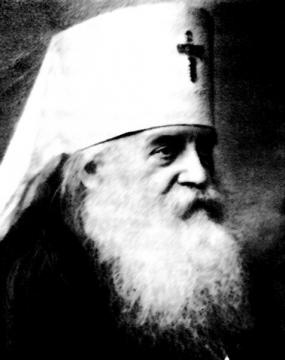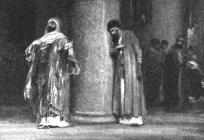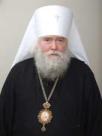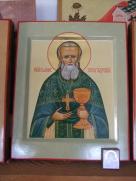Sunday, February 1, 2015
Metroplitan Anthony: Sermon on the day of the Publican and Pharisee (1934)
God, I thank Thee, that I am not as other men are, extortioners, unjust, adulterers, or even as this publican.
Luke 18:11
 To understand the meaning of this parable, we must first eliminate the erroneous interpretation of it. This erroneous interpretation dominates in our secular society, which is not averse to mentioning it in idle talk about the Pharisee in question; but in a totally wrong view of his personality. For our contemporaries, the very word “Pharisee”, before they are conscious or it, conjures an understanding of Pharisees in general as conscious hypocrites…. evil, envious, and dissolute.
To understand the meaning of this parable, we must first eliminate the erroneous interpretation of it. This erroneous interpretation dominates in our secular society, which is not averse to mentioning it in idle talk about the Pharisee in question; but in a totally wrong view of his personality. For our contemporaries, the very word “Pharisee”, before they are conscious or it, conjures an understanding of Pharisees in general as conscious hypocrites…. evil, envious, and dissolute.
Of course, this description is quite applicable to many Pharisees, perhaps the majority, but this is not what our Saviour described in His parable.
First of all, note that the aforementioned Pharisee did not ascribe righteousness to himself. Rather, he thanked God for it, the giver of spiritual wealth. Modern hypocrites and critics of phariseeism express themselves differently: “I am an honorable man, and certainly honest, and therefore I do not allow anyone to step on my toes”. This kind of admission sets the modern “gentleman” a lot lower than the Pharisee. The latter listed his virtues in the face of the all-seeing God, and, of course, could not lie. Consequently, his error was not in inaccuracy or falsity of confession, but rather, in his relation to his own conscience.
 In order to clarify where the mistake or sin lies, we ask our listeners to compare our earthly life with the path of a traveler, who was ordered to go somewhere he did not know. That traveler will be in the right who does not look back at the way, but rather, looks forward, thinking how much he has left to go, asking the help of God and remembering the words of Christ: “No man, having put his hand to the plough, and looking back, is fit for the kingdom of God. ” (Luke 9.62)
In order to clarify where the mistake or sin lies, we ask our listeners to compare our earthly life with the path of a traveler, who was ordered to go somewhere he did not know. That traveler will be in the right who does not look back at the way, but rather, looks forward, thinking how much he has left to go, asking the help of God and remembering the words of Christ: “No man, having put his hand to the plough, and looking back, is fit for the kingdom of God. ” (Luke 9.62)
At the same time, a good Christian should not leave off self-reproach. He should certainly not boast of the successes made in the spiritual life. Of course, this does not mean he should not pray with thanks to the Lord, for what sins or vices the Lord has already delivered him from. However, he should not forget that God would have sent him more abundant gifts of grace, if he only humbled himself, and prayed earnestly, repenting of the sins he happened to commit, forcing himself to new feats of combat against them.
That is what was absent in the aforementioned Pharisee. Therefore, the publican, who bitterly mourned over his sins went to his house more justified than the Pharisee, who was satisfied with his external virtues. Note that expression - more justified.
Hence, the Pharisee was not just boasting before God. He actually tried to please Him and to preserve his conscience pure.
From this it is clear that our whole life should be a constant forward movement, constantly coming closer to God, by the exercise virtue and dissatisfaction with ourselves.
This is what almost none of our secular theologians understand, and even a significant part of the spiritual ones.
Struggle against oneself, self-constraint and self-reproach – that is our way to the heavenly kingdom. If these inner struggles are present, then our whole life will gradually move towards perfection. May the Lord strengthen us in constant remembrance of the proverb we heard today.
Sermon pronounced by Metropolitan Anthony (Khrapovitsky) in 1934 in Sremsky Karlovcy.





